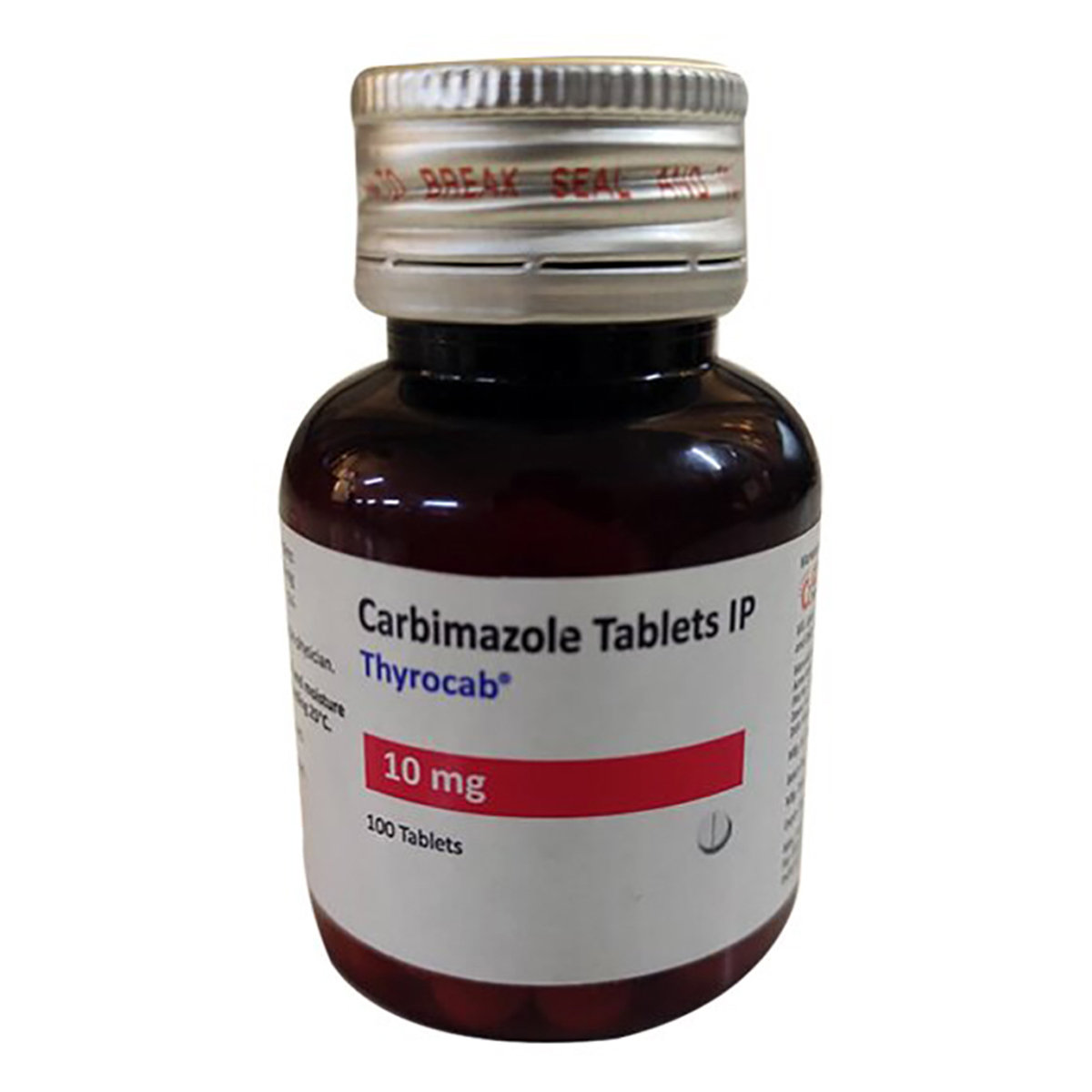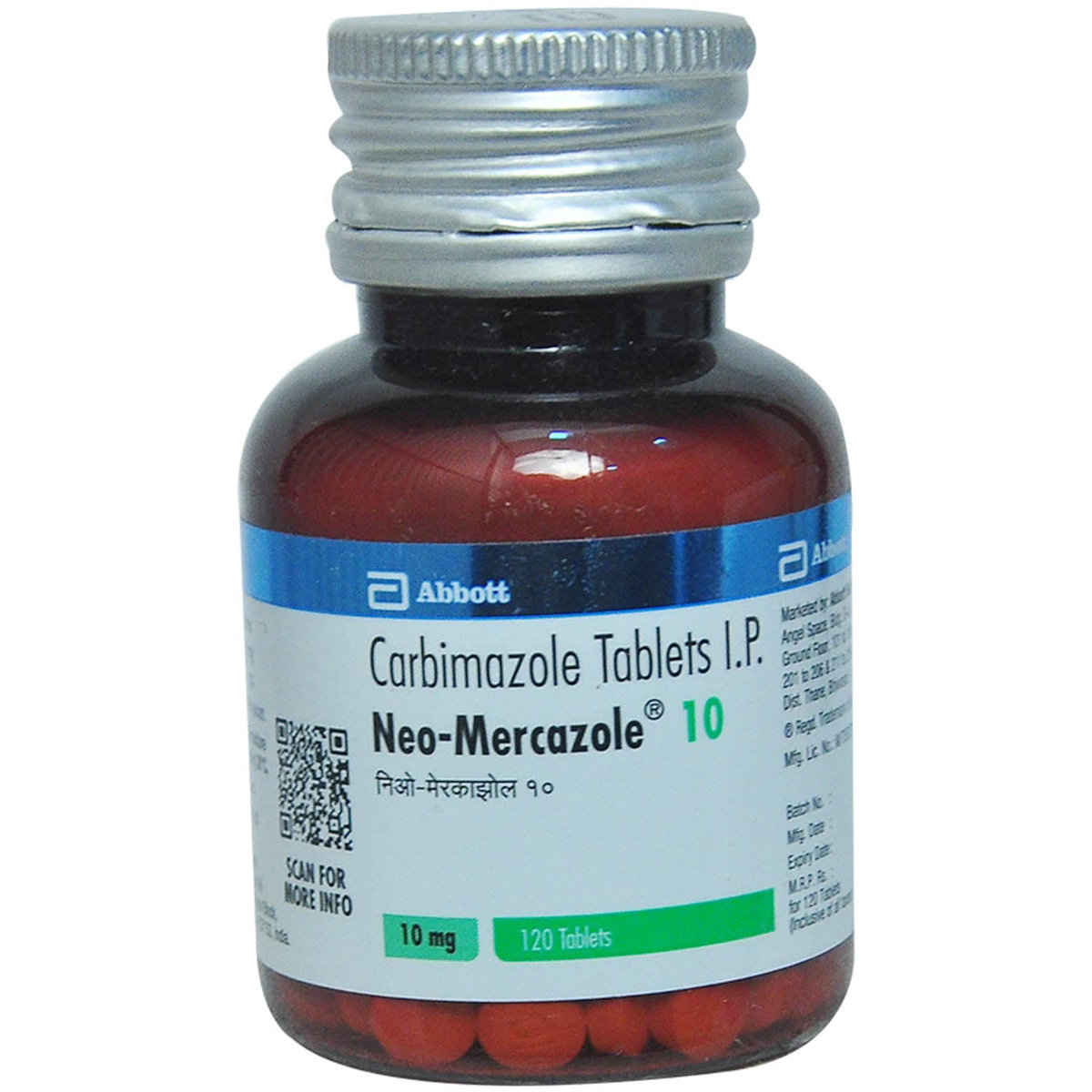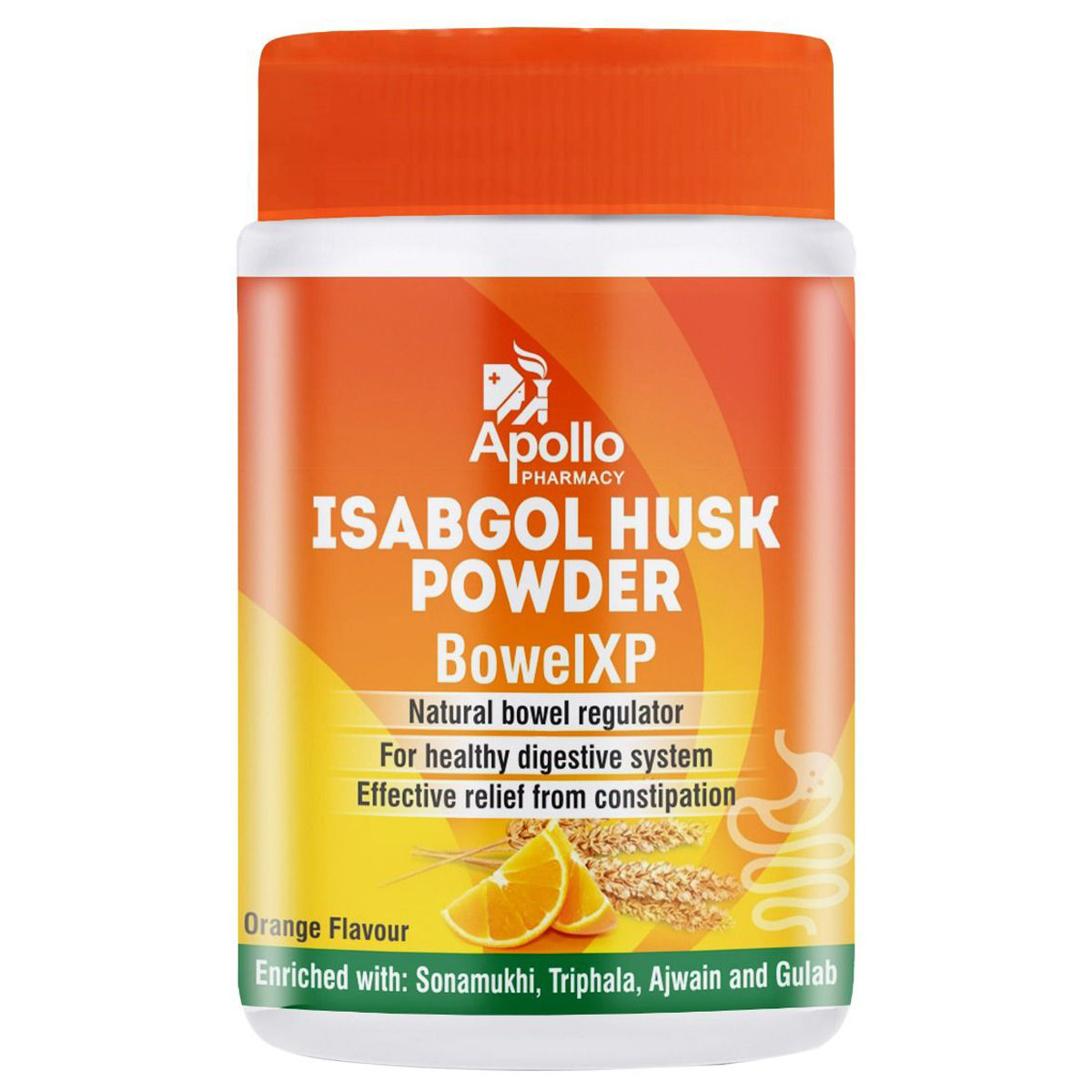Anti Thyrox 10 Tablet
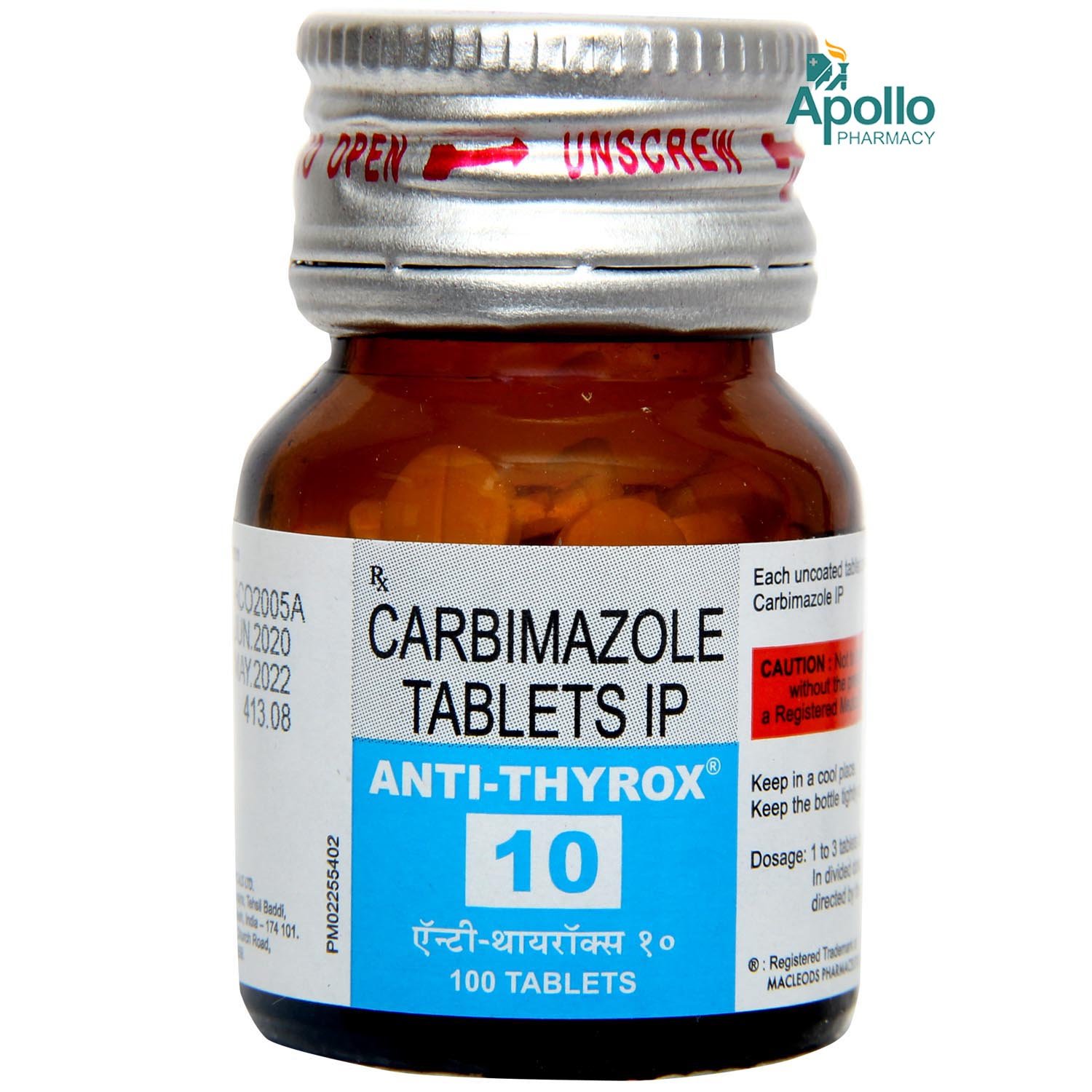
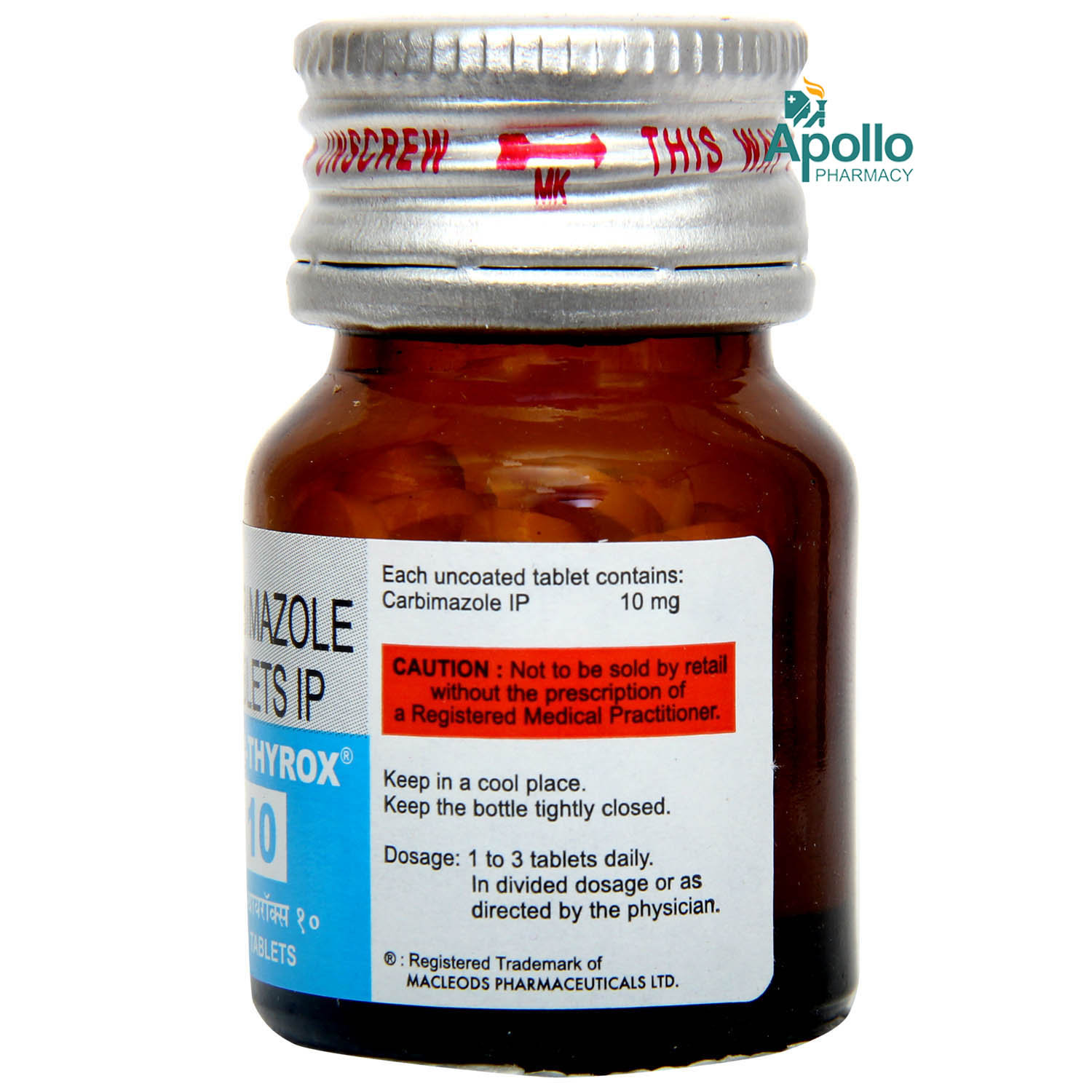
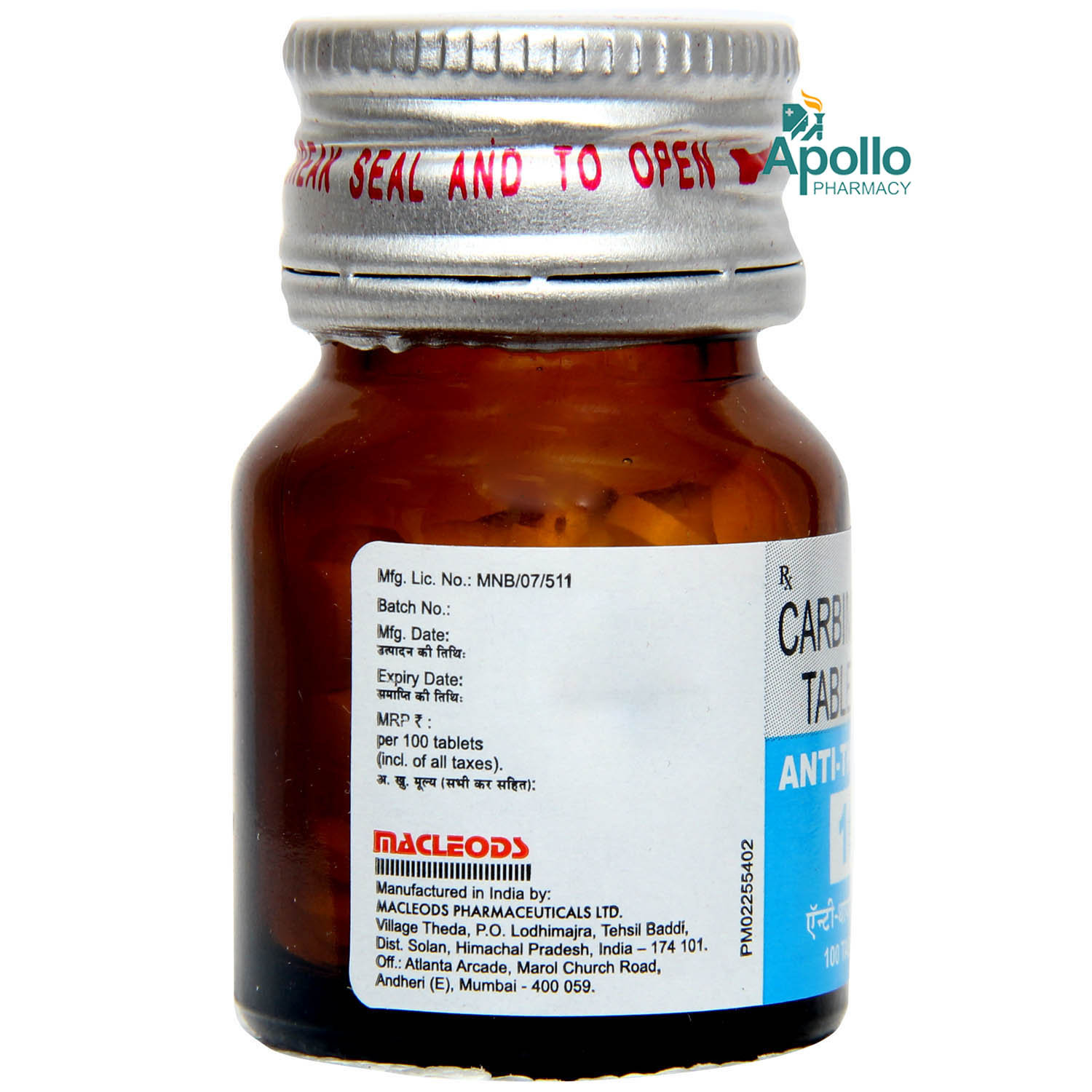
MRP ₹454.5
(Inclusive of all Taxes)
₹68.2 Cashback (15%)
know your delivery time
Provide Delivery Location
Composition :
Manufacturer/Marketer :
Consume Type :
Expires on or after :
Return Policy :
NPPA :

Secure Payment

Trusted by 8 Crore Indians

Genuine Products
Therapeutic Class
Country of origin
Manufacturer/Marketer address
Author Details
We provide you with authentic, trustworthy and relevant information
FAQs
Disclaimer
Alcohol
Safe if prescribed
The interaction of Anti Thyrox 10 Tablet with alcohol is unknown. Please consult a doctor before consuming alcohol while using Anti Thyrox 10 Tablet .
Pregnancy
Consult your doctor
Please consult a doctor if you are pregnant. Anti Thyrox 10 Tablet is given to pregnant women only if the doctor thinks benefits outweigh risks.
Breast Feeding
Consult your doctor
Avoid breastfeeding while taking Anti Thyrox 10 Tablet as it may be excreted in human milk in small amounts. Therefore, please consult a doctor if you are breastfeeding.
Driving
Safe if prescribed
Anti Thyrox 10 Tablet may cause dizziness in some people. So, drive only if you are alert after taking Anti Thyrox 10 Tablet .
Liver
Consult your doctor
Anti Thyrox 10 Tablet should be given with caution, especially if you have a history of Liver diseases/conditions. The dose may be adjusted by your doctor as required. Avoid taking Anti Thyrox 10 Tablet if you have a severe liver disorder.
Kidney
Consult your doctor
Anti Thyrox 10 Tablet should be given with caution, especially if you have a history of Kidney diseases/conditions. The dose may be adjusted by your doctor as required.
Children
Safe if prescribed
Anti Thyrox 10 Tablet is not recommended for children below 2 years as the safety and effectiveness were not established.
Product Substitutes
About Anti Thyrox 10 Tablet
Anti Thyrox 10 Tablet belongs to a class of drugs called anti-thyroid agents used in the treatment of hyperthyroidism (overactive thyroid gland). Hyperthyroidism is a condition in which the thyroid gland produces excessive thyroxine hormone. It increases metabolism and causes unintentional weight loss.
Anti Thyrox 10 Tablet contains Carbimazole that works by decreasing the production of thyroid hormones by the thyroid gland. Thus, it balances the levels of thyroid hormones.
Take Anti Thyrox 10 Tablet as prescribed by your doctor. You are advised to take Anti Thyrox 10 Tablet for as long as your doctor has prescribed it for you based on your medical condition. In some cases, you may experience headache, dizziness, nausea, skin rash, itching, joint pain, changes in taste or hair thinning. Most of these side effects of Anti Thyrox 10 Tablet do not require medical attention and gradually resolve over time. However, if the side effects persist or worsen, please consult your doctor.
If you are known to be allergic to Anti Thyrox 10 Tablet or any other anti-thyroid medicines, please tell your doctor. Anti Thyrox 10 Tablet is not recommended for children below 2 years of age. If you are breastfeeding, avoid taking Anti Thyrox 10 Tablet as it may be excreted in breast milk in small amounts and harm the unborn baby. Please consult a doctor if you are pregnant or planning for pregnancy before taking Anti Thyrox 10 Tablet . You are recommended to use effective contraceptive measures while taking Anti Thyrox 10 Tablet to avoid pregnancy. Drive only if you are alert as Anti Thyrox 10 Tablet may cause dizziness.
Uses of Anti Thyrox 10 Tablet
Medicinal Benefits Mweb
Key Benefits
Anti Thyrox 10 Tablet contains Carbimazole, an anti-thyroid agent used for the treatment of hyperthyroidism. It decreases the production of thyroid hormones by the thyroid gland. Thus, it balances the levels of thyroid hormones.
Directions for Use
Side Effects of Anti Thyrox 10 Tablet
- Headache
- Dizziness
- Nausea
- Skin rash
- Itching
- Joint pain
- Changes in taste
- Hair thinning
Drug Warnings
If you are known to be allergic to Anti Thyrox 10 Tablet or any other anti-thyroid medicines, please tell your doctor. Anti Thyrox 10 Tablet is not recommended for children below 2 years of age. If you are breastfeeding, avoid taking Anti Thyrox 10 Tablet as it may be excreted in breast milk in small amounts and harm the unborn baby. Please consult a doctor if you are pregnant or planning for pregnancy before taking Anti Thyrox 10 Tablet . You are recommended to use effective contraceptive measures while taking Anti Thyrox 10 Tablet to avoid pregnancy. If you require radio-iodine treatment, you may be advised to stop taking Anti Thyrox 10 Tablet temporarily. Drive only if you are alert as Anti Thyrox 10 Tablet may cause dizziness. If you notice light coloured stools, yellowing of eyes or skin, tiredness, stomach pain, dark urine or loss of appetite, please consult a doctor immediately as these might be signs of liver problems.
Drug-Drug Interactions
Drug-Drug Interactions
Login/Sign Up
Drug-Food Interactions
Drug-Food Interactions
Login/Sign Up
Drug-Diseases Interactions
Drug-Diseases Interactions
Login/Sign Up
Drug-Drug Interactions Checker List
- WARFARIN
- THEOPHYLLINE
- PREDNISOLONE
- ERYTHROMYCIN
- DIGOXIN
- METOPROLOL
Habit Forming
Special Advise
- Blood tests are recommended while taking Anti Thyrox 10 Tablet to monitor your response to the treatment.
- Before restarting your treatment, your doctor may advise you on certain tests to check for bone marrow depression.
Diet & Lifestyle Advise
- Avoid caffeine-containing drinks and foods such as regular coffee, black tea, regular soda, energy drinks, and black tea as they may worsen the symptoms of hyperthyroidism.
- Maintain a low iodine diet which includes egg whites, non-iodized salt, black coffee, tea, vegetable oils, honey, nut butter, unsalted nuts, sugar, jelly, jam, lemonade, fruits, moderate portions of chicken, beef, lamb, and turkey.
- Eat vegetables such as cauliflower, broccoli, Brussels sprouts, cabbage, mustard greens, radish, kale, and turnip roots.
- Eat foods rich in selenium like shrimp, beef, chicken, turkey, rice, eggs, cottage cheese, spinach, baked beans, and oatmeal as it helps to achieve normal thyroid levels more quickly.
- Avoid iodine-rich foods such as iodized salt, dairy products, iodine supplements, egg yolks, shellfish, and fish. Also, avoid soy sauce, soy milk, tofu, and soybean oil.
All Substitutes & Brand Comparisons
RX
Carol-10 Tablet 120's
Eris Life Sciences Ltd
₹510.5
(₹3.83 per unit)
6% CHEAPERRX
Out of StockCarbirose 10 Tablet 100's
Prevego Healthcare & Research Pvt Ltd
₹442.8
(₹3.99 per unit)
2% CHEAPERRX
Thyrocab 10mg Tablet 100's
Corona Remedies Pvt Ltd
₹447
(₹4.02 per unit)
1% CHEAPER

Have a query?
Buy best Endocrine Disorders products by
Macleods Pharmaceuticals Ltd
GlaxoSmithKline Pharmaceuticals Ltd
Intas Pharmaceuticals Ltd
Samarth Life Sciences Pvt Ltd
Sun Pharmaceutical Industries Ltd
Zuventus Healthcare Ltd
Alembic Pharmaceuticals Ltd
Cipla Ltd
Akumentis Healthcare Ltd
Glenmark Pharmaceuticals Ltd
Lupin Ltd
Zydus Healthcare Ltd
Alkem Laboratories Ltd
Aristo Pharmaceuticals Pvt Ltd
Cadila Healthcare Ltd
Cadila Pharmaceuticals Ltd
Koye Pharmaceuticals Pvt Ltd
Wockhardt Ltd
Knoll Pharmaceuticals Ltd
Pfizer Ltd
Ranbaxy Laboratories Ltd
Torrent Pharmaceuticals Ltd
Zydus Cadila
Aureate Healthcare
Bharat Sanchar Nigam Ltd
Corona Remedies Pvt Ltd
East West Pharma India Pvt Ltd
Elder Pharmaceuticals Ltd
Ferring Pharmaceuticals Pvt Ltd
GLS Pharma Ltd
German Remedies Ltd
Ind Swift Laboratories Ltd
J B Chemicals & Pharmaceuticals Ltd
Laborate Pharmaceuticals India Ltd
Micro Labs Ltd
Organon India Ltd
Serum Institute Of India Pvt Ltd
Steadfast MediShield Pvt Ltd
Wallace Pharmaceuticals Pvt Ltd
Zee Laboratories Ltd
Abbott India Ltd
Alna Biotech Pvt Ltd
Ar-Ex Laboratories Pvt Ltd
Bal Pharma Ltd
Bestochem Formulations (I) Ltd
Bharat Biotech
Bharat Serums and Vaccines Ltd
Bio Swizz Pharmaceuticals
Biochem Pharmaceutical Industries Ltd
Biocin Genetics & Pharma
Biophar Lifesciences Pvt Ltd
Birla Healthcare Ltd
Centaur Pharmaceuticals Pvt Ltd
DKT India Ltd
Deccan Healthcare
Dey's Medical Stores (Mfg) Ltd
Dolvis Bio Pharma Pvt Ltd
Dr Reddy's Laboratories Ltd
Ecogen (Galpha Laboratories Ltd)
Eli Lilly and Company (India) Pvt Ltd
Emcure Pharmaceuticals Ltd
Emenox Healthcare
Endocard India Pvt Ltd
Eris Life Sciences Ltd
Esmatrix Life Sciences Pvt Ltd
FDC Ltd
Foregen Healthcare Ltd
Franco Indian Pharmaceuticals Pvt Ltd
Galcare Pharmaceuticals Pvt Ltd
Genecaessentia Life Sciences
Getwell Life Sciences India Pvt Ltd
Gladstone Pharma India Pvt Ltd
Hetero Drugs Ltd
Icon Life Sciences
Indi Pharma Pvt Ltd
Indoco Remedies Ltd
Innovcare Life Sciences Pvt Ltd
Integrace Pvt Ltd
Intergrace Pvt Ltd
Ipca Laboratories Ltd
Jagsonpal Pharmaceuticals Ltd
Keimed Pvt Ltd
Kenn Pharma Pvt Ltd
Lg Life Sciences India Pvt Ltd
Maneesh Pharmaceuticals Ltd
Medopharm Pvt Ltd
Merck Ltd
Msd Pharmaceutical Pvt Ltd
Mylan Pharmaceuticals Pvt Ltd
Neon Laboratories Ltd
Nutri Pharma
Obsurge Biotech Ltd
Prem Pharmaceuticals Pvt Ltd
Procter & Gamble Hygiene And Health Care Ltd
Rekvina Pharmaceuticals
Saffron Therapeutics Pvt Ltd
Sain Medicaments Pvt Ltd
Sbeed Pharmaceuticals
Searle India Ltd
Skylane Pharmaceuticals
Frequently Bought Together
Customers Also Bought




